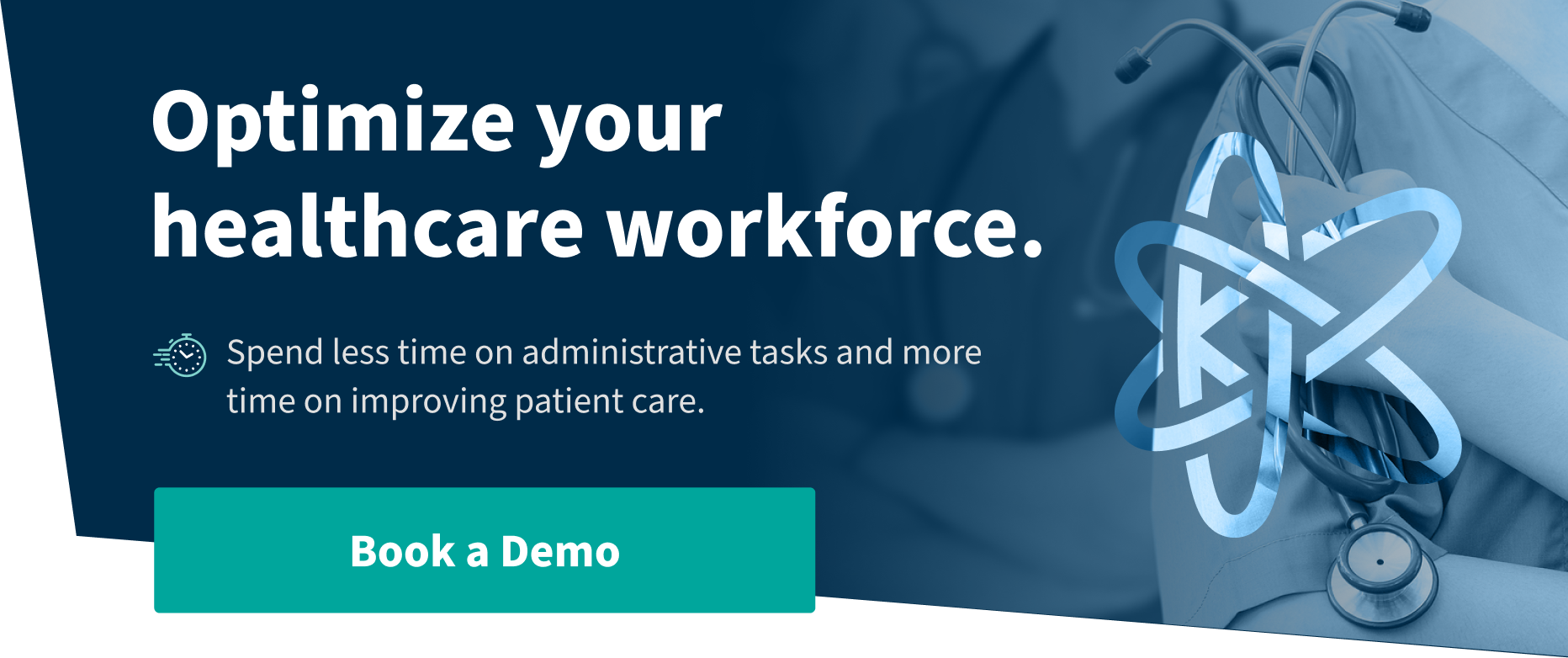Salesforce CRM is a leading industry-agnostic customer relationship management platform that helps businesses manage and optimize their customer interactions and sales processes. As a cloud-based solution, Salesforce provides a comprehensive suite of tools that enable companies across various sectors to track and analyze customer data, manage leads, contacts, and opportunities, and streamline their sales operations.
While Salesforce primarily focuses on delivering a robust, industry-agnostic CRM solution, it has also developed specialized offerings for specific sectors. One such example is Salesforce Health Cloud, which is designed to enhance patient experiences in the healthcare industry.
Salesforce Health Cloud primarily focuses on patient relationship management and does not significantly address healthcare workforce management. Effective healthcare workforce management software is essential for optimizing staff scheduling, improving patient care, reducing labor costs, and ensuring regulatory compliance. These systems help manage personnel and scheduling, monitor worker time, optimize staffing levels, and streamline payroll administration.
Key Features of Salesforce CRM for Healthcare Management
Salesforce CRM, particularly its Health Cloud offering, presents some compelling features. However, it's important to consider how these features align with the specific needs of managing healthcare personnel. Let's explore three key strengths of Salesforce CRM in this context:
Marketing and Customer Engagement Features
Salesforce CRM's marketing and customer engagement features, while primarily designed for patient interactions, offer potential applications in healthcare workforce management. The platform's robust email marketing tools, for instance, could be repurposed for internal communications, keeping staff informed about policy changes, training opportunities, or organizational updates. The campaign management functionality could be adapted to run recruitment drives or employee engagement initiatives.
For example, a hospital could use Salesforce to create targeted campaigns for hiring specialized nurses, tracking applicant interactions throughout the recruitment process. However, it's important to note that these features are not inherently designed for workforce management. Customization would be required to tailor them to internal use cases, such as creating custom objects for job roles or modifying lead scoring models to evaluate employee performance. While possible, this adaptation process may require significant time and resources, potentially making dedicated workforce management solutions more efficient for healthcare organizations.
Automation Capabilities
Salesforce CRM's automation capabilities offer intriguing possibilities for streamlining certain aspects of healthcare workforce management. The platform's Process Builder and Flow tools could be utilized to automate various HR processes.
For instance, onboarding workflows could be created to automatically assign tasks, send welcome emails, and schedule orientation sessions when a new employee is added to the system. Performance review processes could be automated, triggering evaluation forms at specific intervals and routing them to appropriate managers. Salesforce's Einstein AI could potentially be leveraged to predict staffing needs based on historical data and patient admission trends.
However, while these automation features are powerful, they are not specifically designed for the unique challenges of healthcare workforce management. Complex shift scheduling, a critical aspect of healthcare staffing, would require additional customization or third-party apps. Similarly, automating compliance tracking for medical certifications and continuing education requirements would need careful configuration to meet healthcare-specific regulations.
Integration Potential
Salesforce CRM's strong integration capabilities present opportunities for creating a more comprehensive healthcare workforce management solution. The platform's open API and extensive AppExchange marketplace allow for connections with a wide range of third-party applications.
For example, a hospital could integrate Salesforce with a specialized healthcare scheduling system to manage complex shift rotations while maintaining staff records in Salesforce. Integration with learning management systems could help track employee training and certifications directly within the CRM.
While these integrations are possible, they require careful planning and ongoing maintenance. Organizations would need to consider the costs and complexities of implementing and managing multiple integrations. Additionally, data synchronization between systems can be challenging, potentially leading to discrepancies if not properly managed. While Salesforce's integration potential is a strength, healthcare organizations must weigh the benefits against the resources required to create and maintain a fully integrated workforce management ecosystem.
Customization
For organizations with large technology teams, Salesforce can be customized for your needs. But this will require dedicated technical leadership and a dedicated Saleforce developer team to maintain and build out your specific Salesforce customization needs.
Considerations When Using Salesforce for Healthcare Workforce Management

While Salesforce offers many powerful features, there are some areas where it may not fully meet the specific needs of healthcare workforce management.
User interface complexity and learning curve
Salesforce's user interface is often criticized for being overwhelming, especially for new users. The sheer number of features, buttons, and customization options can lead to a steep learning curve and reduced productivity. Many users find themselves lost in the maze of menus, tabs, and settings, struggling to locate basic functions. This complexity can result in underutilization of the platform's capabilities, as users may stick to only the features they're comfortable with.
The cluttered interface can slow down workflow, requiring multiple clicks to perform simple tasks. While the extensive customization options are beneficial for power users and administrators, they can be a hindrance for average users who need a more streamlined experience. This often necessitates extensive training and ongoing support to ensure effective use of the CRM.
Customer support challenges
Salesforce's customer support has been a point of contention for many users. Despite being a leading CRM provider, their support system often falls short of expectations. Users frequently report long wait times when seeking assistance, whether through phone, email, or chat support. The quality of support can be inconsistent, with some users receiving prompt and helpful responses while others struggle to get adequate solutions to their issues.
Another common complaint is the reliance on community forums and documentation for problem-solving, which can be time-consuming and frustrating for users facing urgent issues.
The tiered support system, where higher levels of support come at an additional cost, is also a source of dissatisfaction for some customers who feel that comprehensive support should be included in the already significant investment in the platform. This can be particularly challenging for smaller businesses with limited resources.
Reporting and Analytics
While Salesforce offers powerful reporting capabilities, many users find the process of creating and managing reports to be unnecessarily complex. The report builder, while feature-rich, can be unintuitive for users without technical backgrounds. Creating custom reports often requires a deep understanding of Salesforce's data structure and relationships between objects. This complexity can lead to frustration and errors in report generation, potentially resulting in inaccurate data analysis.
Managing existing reports can also be challenging, with users struggling to organize, update, and share reports effectively. The lack of user-friendly, drag-and-drop interfaces for more advanced reporting features means that many organizations need to rely on Salesforce administrators or developers to create and maintain their reporting ecosystem. This dependency can lead to bottlenecks in data analysis and decision-making processes, impacting the overall efficiency of using Salesforce as a CRM solution.
A Tool Designed for Healthcare Workforce Management

If you're looking for a comprehensive healthcare workforce relationship management solution that addresses the unique challenges of the healthcare industry, Kimedics offers a compelling alternative to general-purpose CRMs.
Here are 3 reasons to choose Kimedics.
Healthcare-specific functionality and features
Kimedics can help you:
- Optimize scheduling with automated and flexible tools that handle complex healthcare shifts while ensuring compliance with industry regulations.
- Streamline credential management by providing a centralized system to track and manage medical certifications and licenses for your entire workforce.
- Accurately monitor time and attendance, integrating seamlessly with various time clock systems to ensure precise payroll and billing.
- Maintain compliance by offering robust tools that monitor staff adherence to regulatory requirements and internal policies, reducing risk and ensuring quality care.
- Empower your staff with a mobile app that allows them to view schedules, request shifts, and communicate effortlessly on the go, enhancing work-life balance and job satisfaction.
- Gain valuable insights through comprehensive analytics and reporting features, helping you identify workforce trends and improve operational efficiency across your healthcare organization.
Dedicated customer support
Good support is crucial in healthcare settings where operational continuity is critical and staff may need immediate assistance with the system. Kimedics prides itself on providing excellent customer support.
This includes responsive help desk services, personalized onboarding assistance, and ongoing training to ensure users can maximize the platform's benefits. Support staff are well-versed in healthcare terminology and workflows, allowing them to provide context-specific assistance. Kimedics may provide role-specific training sessions, online learning resources, and regular webinars to keep users updated on new features and best practices.
Fast, reliable, and user-friendly
The system's speed is optimized for quick loading times and rapid data processing, which is crucial in fast-paced healthcare environments where delays can impact patient care. Every second counts when managing staff schedules and responding to sudden changes, and Kimedics ensures that users can access and manipulate data without frustrating lag times.
The platform's stability is a cornerstone of its reliability. Kimedics employs robust infrastructure with built-in redundancies to guarantee minimal downtime. Their system architecture is designed to handle high volumes of concurrent users and data transactions without compromising performance. In the rare event of an issue, Kimedics has comprehensive disaster recovery plans in place to swiftly restore service, ensuring that healthcare operations can continue uninterrupted.
User-friendliness is at the heart of Kimedics' design philosophy. The interface is crafted with direct input from healthcare professionals to align seamlessly with their workflows. It features intuitive navigation between related information, such as effortlessly moving from a staff member's schedule to their credentials. The system uses smart design elements for different types of shifts and customizable dashboards for various user roles, making it easy for both administrators and staff to quickly find the information they need.
Schedule a personalized demo with the Kimedics team here and see for yourself what the tool can do for you.


